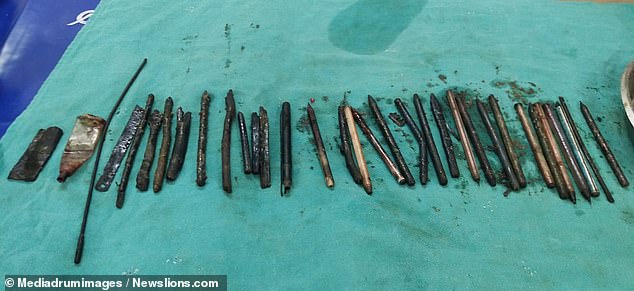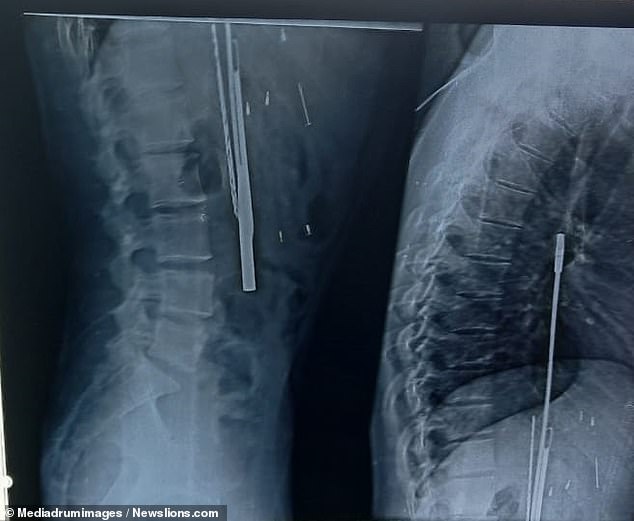Hot Stories
Recent Stories
Shocker! Doctors Remove 33 Objects Including Razor Blades And Screwdriver From A Man's Stomach
Posted by Samuel on Thu 18th Jul, 2019 - tori.ngSeveral objects including razor blades and a screwdriver have been found inside a man's stomach by doctors.

Doctors have removed 33 objects, including razors and knives, from the stomach of an Indian man.
Yogesh Thakur, 30, was admitted to hospital on July 14 after he complained of severe stomach pain.
His mother, Kusma Thakur, told doctors her son would 'grab anything and eat it', leading them to conduct x-rays.
They were stunned to find objects such as a knife, screwdriver, razor blades and plastic items inside Mr Thakur's stomach.
Two days later, doctors extracted all the objects in an operation and Mr Thakur, a part-time farmer, is now recovering and will receive psychiatric help.
Yogesh Thakur, 30, was admitted to hospital on July 14 after he complained of severe stomach pain.
His mother, Kusma Thakur, told doctors her son would 'grab anything and eat it', leading them to conduct x-rays.
They were stunned to find objects such as a knife, screwdriver, razor blades and plastic items inside Mr Thakur's stomach.
Two days later, doctors extracted all the objects in an operation and Mr Thakur, a part-time farmer, is now recovering and will receive psychiatric help.

Doctors treated Mr Thakur at MPN Khare Surgical and Maternity Nursing Home in the city of Chhatarpur, about 370miles (600km) south of New Delhi.
Mr Thakur's doctors said it's likely he suffers with acuphagia, a disorder in which people eat sharp or metal objects and other items they can't digest.
Acuphagia is a category of pica, an eating disorder whereby the person cannot help eating non-food items such as dirt, talcum powder or paint.
It often occurs alongside mental health disorders that impair functioning, such as autism or schizophrenia.
Doctors said Mr Thakur suffered from altered mental status (AMS).
This is a general term used to describe various disorders of mental functioning such as defects in judgement or thought, confusion and unusual or strange behaviour.
Mr Thakur's doctors said it's likely he suffers with acuphagia, a disorder in which people eat sharp or metal objects and other items they can't digest.
Acuphagia is a category of pica, an eating disorder whereby the person cannot help eating non-food items such as dirt, talcum powder or paint.
It often occurs alongside mental health disorders that impair functioning, such as autism or schizophrenia.
Doctors said Mr Thakur suffered from altered mental status (AMS).
This is a general term used to describe various disorders of mental functioning such as defects in judgement or thought, confusion and unusual or strange behaviour.

According to Mrs Thakur, her son has shown symptoms of strange behavioural patterns since he was a child, but she thought he would grow out of it.
She said: 'He grabs anything and eats it. But we were surprised when we came to know that he could eat such dangerous things too.'
Dr MNS Khare, who performed the operation, said: 'It was a rather difficult surgery as he suffered from hypertension [high blood pressure].
'We were shocked and surprised to find over thirty sharp objects inside his abdomen.'
Dr Khare said Mr Thakur is currently recovering and will be discharged within the next five days.
The prevalence of pica is not known but it is believed to be more common in developing countries, according to the National Eating Disorders Associations.
She said: 'He grabs anything and eats it. But we were surprised when we came to know that he could eat such dangerous things too.'
Dr MNS Khare, who performed the operation, said: 'It was a rather difficult surgery as he suffered from hypertension [high blood pressure].
'We were shocked and surprised to find over thirty sharp objects inside his abdomen.'
Dr Khare said Mr Thakur is currently recovering and will be discharged within the next five days.
The prevalence of pica is not known but it is believed to be more common in developing countries, according to the National Eating Disorders Associations.
***
Source: Daily Mail UK
Top Stories
Popular Stories
Stories from this Category
Recent Stories


















































